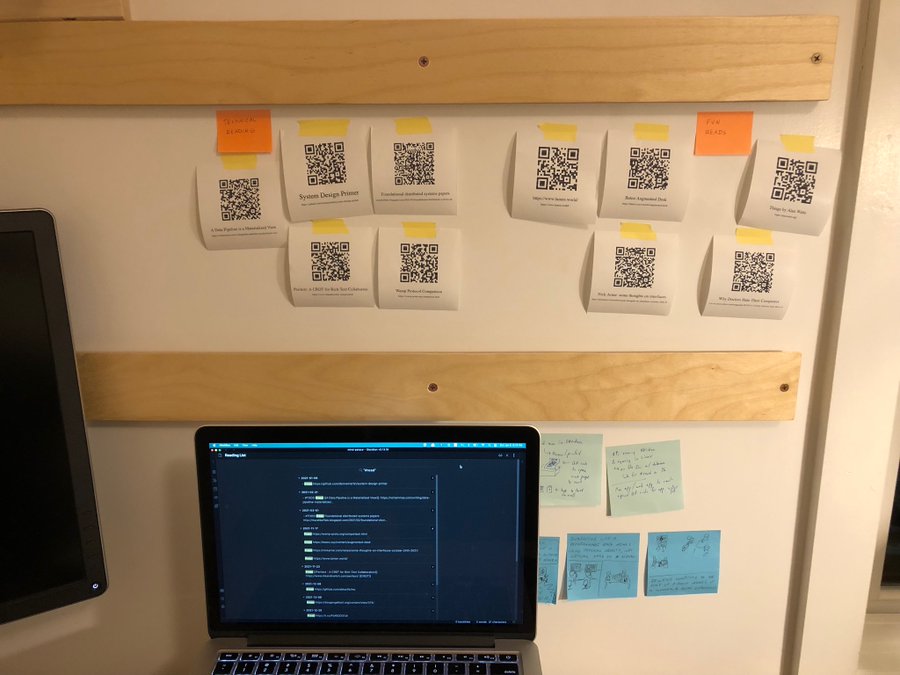reply to u/IamOkei at https://www.reddit.com/r/Zettelkasten/comments/17beucn/comment/k5s6aek/?utm_source=reddit&utm_medium=web2x&context=3
u/IamOkei, I know you've got a significant enough practice that not much of what I might suggest may be helpful beyond your own extension of what you've got and how it is or isn't working for you. Perhaps chatting with a zettelkasten therapist may be helpful? Does anyone have "Zettelkasten Whisperer" on a business card yet?! More seriously, I occasionally dump some of my problems and issues into a notebook, unpublished on my blog, or even into a section of my own zettelkasten, which I never index or reconsult, as a helpful practice. Others like Henry David Thoreau have done something like this and there's a common related practice of writing "Morning Pages" that you can explore. My own version is somewhat similar to the idea of rubber duck debugging but focuses on my own work. You might try doing something like this in one of Bob Doto's cohorts or by way of private consulting sessions. Another free version of this could be found by participating in Will's regular weekly posts/threads "Share with us what is happening in your ZK this week" at https://forum.zettelkasten.de/. It's always a welcoming and constructive space. There are also some public and private (I won't out them) Discords where some of the practiced hands chat and commiserate with each other. Even the Obsidian PKM/Zettelkasten Discord channels aren't very Obsidian/digital-focused that you couldn't participate as an analog practitioner. I've even found that participating in book clubs related to some of my interests can be quite helpful in talking out ideas before writing them down. There are certainly options for working out and extending your own practice.
Beyond this, and without knowing more of your specific issues, I can only offer some broad thoughts which expand on some of the earlier discussion above.
I recommend stripping away Scheper's religious fervor, some of which he seems to have thrown over lately along with the idea of a permanent note or "main card" (something I think is a grave mistake), and trying something closer to Luhmann's idea of ZKII.
An alternate method, especially if you like a nice notebook or a particular fountain pen, might be to take all of your basic literature/fleeting notes along with the bibliographic data in a notebook and then just use your analog index cards/slips to make your permanent notes and your index.
Ultimately it's all a lot of the same process, though it may come down to what you want to call it and your broad philosophy. If you're anti-antinet, definitely quit using the verbiage for the framing there and lean toward the words used by Ahrens, Dan Allosso, Gerald Weinberg, Mark Bernstein, Umberto Eco, Beatrice Webb, Jacques Barzun & Henry Graff, or any of the dozens of others or even make up your own. Goodness knows we need a lot more names and categories for types of notes—just like we all need another one page blog post about how the Zettelkasten method works by someone who's been at it for a week. Maybe someone will bring all these authors to terms one day?
Generally once you know what sorts of ideas you're most interested in, you take fewer big notes on administrivia and focus more of your note taking towards your own personal goals and desires. (Taking notes to learn a subject are certainly game, but often they serve little purpose after-the-fact.) You can also focus less on note taking within your entertainment reading (usually a waste) and focusing more heavily on richer material (books and journal articles) that is "above you" in Adler's framing. You might make hundreds of highlights and annotations in a particular book, but only get two or three serious ideas and notes out of it ultimately. Focus on this and leave the rest. If you're aware of the Pareto principle or the 80/20 rule, then spend the majority of your time on the grander permanent notes (10-20%), and a lot less time worrying about the all the rest (the 80-90%).
In the example above relating to Marx, you can breeze through some low level introductory material for context, but nothing is going to beat reading Marx himself a few times. The notes you make on his text will have tremendously more value than the ones you took on the low level context. A corollary to this is that you're highly unlikely to earn a Ph.D. or discover massive insight by reading and taking note posts on Twitter, Medium, or Substack (except possibly unless your work is on the cultural anthropology of those platforms).
A lot of the zettelkasten spaces focus heavily on the note taking part of the process and not enough on the quality of what you're reading and how you're reading it. This portion is possibly more valuable than the note taking piece, but the two should be hand-in-glove and work toward something.
I suspect that most people who have 1000 notes know which five or ten are the most important to where they're going and how they're growing. Focus on those and your "conversations with texts" relating to those. The rest is either low level context for where you're headed or either pure noise/digital exhaust.
If you think of ideas as incunables, which notes will be worth of putting on your tombstone? In other words: What are your "tombstone notes"? (See what I did there? I came up with another name for a type of note, a sin for which I'm certainly going to spend a lot of time in zettelkasten purgatory.)
